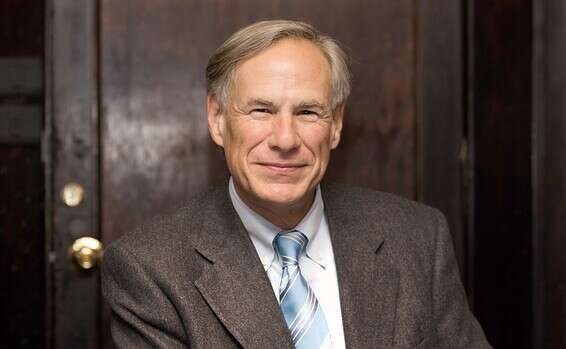Any Israeli visiting Texas will immediately feel at home.
It could be because of the weather, the flora, the diversity, and multiculturalism, but it could also be because of that unrelenting, even rebellious spirit, Texans have, which is so similar to the Israeli mindset.
In fact, in Hebrew slang, when you want to call someone a native Israeli, you say he is a sabra, which means prickly pear.
The prickly pear cactus happens to be the official state plant of Texas.
Follow Israel Hayom on Facebook and Twitter
Texas Governor Greg Abbott visited Israel last week to see first hand just how Israel and Texas, despite being so different in size, are very much alike in everything else.
"There is a similarity, whether it be religious beliefs, whether it is our core of facing challenges and overcoming them. No one has really dealt with that more than the Jewish people over the span of centuries. This is the same thing that Texas was made out of from our very beginning," Abbott, 62, said in an interview with Israel Hayom during his visit.
"Overcoming the loss of the Alamo, going on to win the Battle of San Jacinto and becoming our own country … ever since then, we have been a state that has overcome challenges. And interestingly we are the Lone-Star State, and that is what Israel is," Abbott noted with pride.
Both Israel and Texas have a single star on their national flags. Israel's has a Star of David in blue on a white background, whereas the Texas flag has a five-point star on a blue background (next to red and white stripes).
Abbott said he learned a lot from his visit to Israel, but more importantly, he was awed.
"Israel is always fabulous, as you know I was here four years ago and things are even nicer now than they were four years ago. I had a very effective series of meetings, several in Tel Aviv and several in Jerusalem, making both business connections and cultural ties. Same thing this time. In Tel Aviv, where we began our trip this time, we had a day of meetings where we visited Start-up Nation Central [a nonprofit whose mission is to "connect business, government, and NGO leaders from around the world with Israeli innovation"]. There are a lot of connections between them in Tel Aviv and businesses in Texas."
Q: Can you tell us specific examples of what you did there and the ties you formed?
"Several things. First, we had a great presentation, by Start-up Nation Central about what they do. And then in addition to that, we had several businesses make presentations about their connections with businesses in Texas. A couple of examples would be a cybersecurity firm, another is an avionics firm that deals with things like drones and flying devices that have headquarters in Houston, Texas, energy businesses, and so many others, and of course a lot in the healthcare arena. There are a tremendous amount of healthcare advancements in Israel and healthcare technologies that start here [in Israel]. We had some great conversations with people about ways we can plug those in Texas."
When the US declared independence in 1776, Texas was not part of the newly created union.
In fact, only in 1836 it became independent from Mexico and about ten years later it formally joined the United States as the 28th state. This annexation was a marriage of convenience for both sides; the US wanted the land, and Texas wanted security.
But since then Texans have always had a desire to carve out their own unique American experience, to be as independent as possible even if formally under the auspices of Washington.
Abbott arrived in Israel to promote the bilateral cooperation, which he says goes far beyond the business realm.
"We got to tour the Friends of Zion Museum, showing us the miracle of Israel. It's a miracle written in the books long ago, that's the way it is supposed to be. And we are proud in Texas, to be strong supporters of Israel, from a biblical standpoint, from a faith standpoint, but also from a geopolitical standpoint we are strong believers in our religious heritage and the connection that provides part of the fundamental foundations of America.
"The United States of America was premised on one thing, more paramount than anything else, and that is the rule of law, and a core component of the beginnings of the rule of law came from Moses himself. I personally defended that," Abbott said, recalling one of his most famous achievements as attorney general of Texas in 2005, when he fought to have the Ten Commandments displayed in public in Austin, convincing the highest court of the land that this was not in violation of the Establishment Clause in the US Constitution that prohibits the government from endorsing a specific faith.
"We had this monument on the Texas State Capitol grounds about as tall as you are, and I won a Supreme Court battle [to have it stay] based upon the argument that it was representative of some of the founding principles of the State of Texas and that therefore this is why we should be able to display what some of our founding principles are."
Abbott is proud of this landmark case, saying that the Supreme Court accepted his argument that the display of the Decalogue was not in violation of the separation of religion and state because the monument reflected a cultural component of public life that is innate to the heritage of Texas as a whole.
Abbott, a Catholic, says US President Donald Trump has managed to win over devout Christians and evangelical voters because of his attitude to Israel and his warm embrace of religion.
"The evangelicals in Texas as well as across the country believe strongly in our faith and we appreciate seeing a president who embraces and supports faith and religion. Especially the way that he does and then acts on it in very profound ways. We love seeing a president who is bold enough and so strong with regard to embracing and supporting Israel; it is important to us geopolitically. He is a bold and visionary president who really has connected the faith base in the US with his politics but also with Israel."
Q: Can Israel be what it is without the US? Can it survive without American support?
"I believe in a strong future for Israel. Period. I believe its pathway to that future is swifter and stronger with the United States. I view the Israeli-American alliance to be essential for the future of the world, not just for our two countries, but for the entire world, and it is essential that America and Israel continue to partner."
Q: Do you think Israel can learn something from Texas?
"I think Israel can learn something from Texas, and I think Texas can learn something from Israel; I think it goes both ways. But what Israel can learn from Texas, and what everybody can learn from Texas, is that Texas is the ultimate entrepreneurial state. Texas is the ultimate capitalist state. It is the state where you can come from anywhere and start a business and grow it into a multibillion enterprise. So that is why more people live in Texas than almost any other state in the US, because we are a magnet for economic opportunity. That is exactly what Israel has begun to demonstrate over the past several decades by being a start-up nation and with the growth of so many enterprises. This really aided the future of Israel and made sure that the people of Israel will always be able to take care of themselves."
Last August, a deranged man killed 22 people at a shopping complex in El Paso, Texas.
The horrific incident struck at the very core of the celebrated coexistence in the state. The blow was particularly painful because the perpetrator had written a manifesto replete with anti-immigrant language.

Everyone looked up to Abbott to heal the wounds and the governor, without much fanfare, became consoler-in-chief of the state, and the entire nation.
He provided confidence and optimism at that hour of grief, proving that no one can "mess with Texas" and unravel its social fabric.
Q: What did it feel like to be the focus of attention after that shooting?
"There are sometimes challenges that come our way. It could be that, or it could be the Hurricane Harvey that devastated cities and communities up and down the coastline. And what people count on us to have a governor who is going to step up and be compassionate and caring and supportive of them, and that is exactly what I did."
Texas is the second-most populous state in the US, and as such has great weight in any presidential race due to its 38 electoral votes.
It has consistently been in the Republican column on the national level, even though Democrats have managed to win elected office at the state level and have a strong presence in the state legislature.
Many on the Left predict that Texas may turn blue in the coming decade on the national level because of the growing strength of the Latinos.
This, according to analysts, could result in the Lone-Star State giving its electoral votes to the Democratic nominee for president as early as 2024. But that is not a foregone conclusion because the Latino vote is not as monolithic as some think.
Q: You won about 44% of the Hispanic vote and you are now the most popular you have ever been among the general public. How did you do that?
"You got to go to work every single day, fighting for the people of Texas. They know that I am committed to helping them and their families improve their pocketbook issues, make sure they have better jobs and that everyone is going to have access to a job if they want one. Then there is the implementation of school reforms, reducing property taxes, and the fact that I have been very assertive across the entire state in ensuring that public safety is the No. 1 issue so that people will feel safer in their homes and communities. So people know that I am going to work for them, every single day."
Q: Do you think that Texas may in fact switch to the Republican column?
"In politics, you never want to take anything for granted. And you never can take an election for granted. But if we take care of business and we go to work and do our job and work hard, we will keep Texas a very strong Republican state."
When Abbott was in his 20s, he was struck by a falling tree while jogging. Ever since he has been paralyzed from the waist down.
For Abbott, being wheelchair-bound gave him a new perspective on life and made him a better person.
Q: How much would you have wanted your life trajectory to be different?
"I do believe first of all, that whatever trajectory my life is, it is because of the connection to God. And all of what I have wanted from life is for me to do the will of God."
Q: I can't let you go before asking you about your future. Since there is a precedent for a Texas governor becoming president, what's next for you?
"The way things go, I have first things first. The first thing, I am running for re-election. My re-election is in 2022, and then after that, I will go wherever God leads me."




